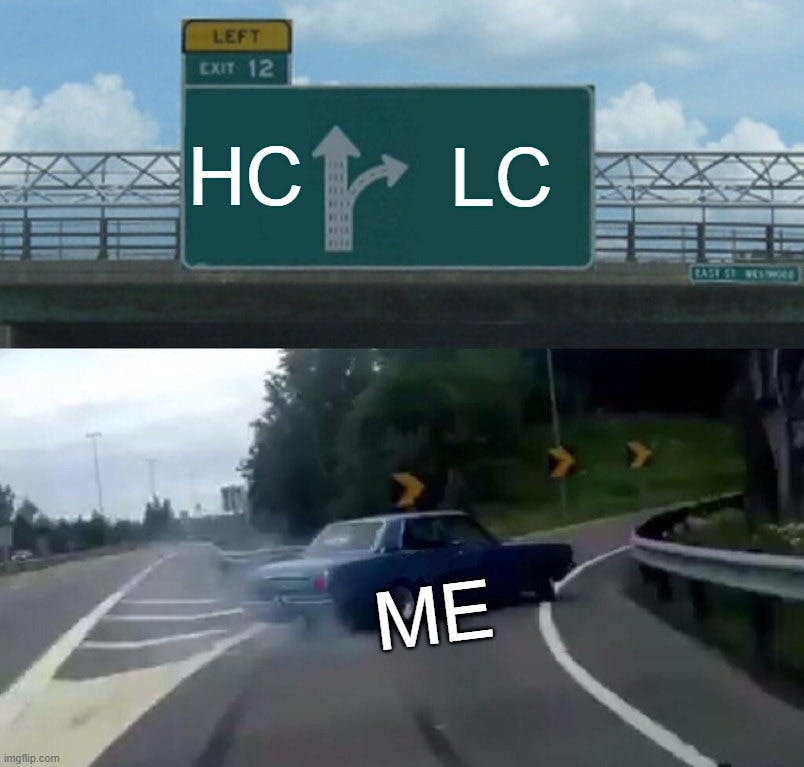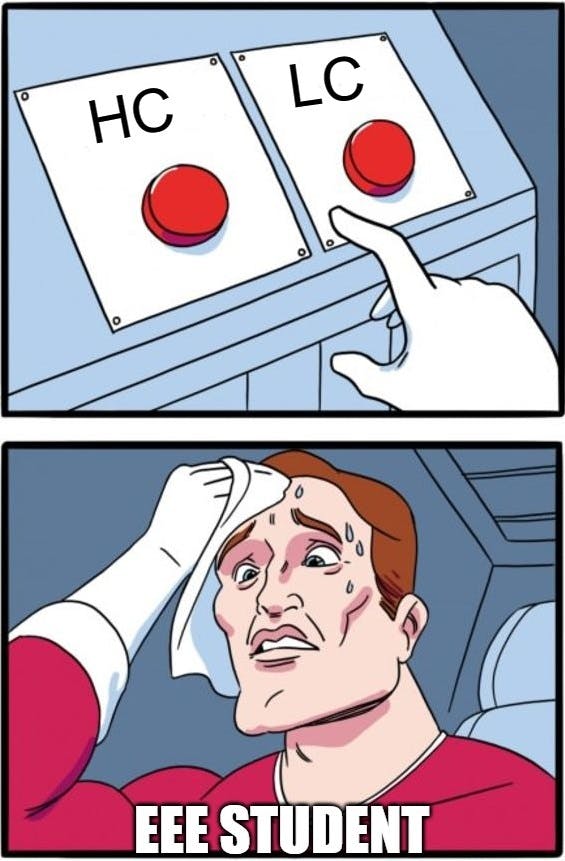Was it too early to specialise?
I chose LC over HC; now I have to carry my own cross.
Choosing an academic specialisation can be a hassle at times—students in their final years can attest to this. It's like choosing a marriage partner, deemed a key decision that will certainly influence your life. Nevertheless, however daunting this choice might seem, there is always a right option! Of course, with several heuristics.
I am an electrical and electronic engineer by training. I graduated with a bachelor's degree a few months ago, and I've been in the industry for about a year now. Certainly, my time outside school got me asking myself if I specialised too early.
I chose the future
More often than not, I wondered why someone, in their right mind, would choose HC. To me then, HC was the "world", and LC was the "future." I needed enough convincing to change my mind—just like Steven Crowder on matters of male privilege.
For those of us who don't know what HC or LC is all about, relax.
Here I go: there is the world, and then there is the future.
At my university, a student taking a bachelor's degree in electrical and electronic engineering (EEE) had to choose between two options: heavy current (HC) and light current (LC) before their fourth year of study.
I don't know about other universities. There may be other options or our two options may be treated as different courses dubbed with "fancy" names.
Time to know the difference:
Just the other day, before "they" could let us decide, the chairman of the EEE department came and highlighted the distinct features between HC and LC.
"Choosing an option generally means that you'll do some units differently from your colleagues who chose the other option."
These units were called electives. HC was more of a power systems/machines option, whereas the LC option was more electronics/telecommunications.

It was time for the "left exit 12 off-ramp!" I chose the future—I was fascinated by it.
The world vs the future
EEE students, in their first three years of the course, undertake foundational mathematics courses, learn basic electrical and electronic principles, and pursue general college studies.
The first year focuses on bridging the knowledge from high school: students learn physics, chemistry, and core mathematics units, and are also introduced to engineering courses such as drawing and design.
The second and third years are when one truly finds out what they've gotten themselves into. An EEE student will study circuit theory, electrical and electronic principles, get introduced to computer programming and also touch on related fields such as mechanical engineering. It is also during this period that one delves deep into the calculations behind engineering principles covering calculus, differential equations, statistics, numerical analysis, and complex analysis.
The fourth and fifth year courses reinforce what the student has already learnt, and it is before then that one specialises. There are common courses for both options, like control engineering, microprocessors, research methodology, management, marketing, as well as finance and accounting.
Choosing LC meant that I would delve deep into communication systems, understand signals and microwaves, play around with visual display systems, design digital systems and integrated circuits, appreciate quantum electronics, configure networks and teletraffic systems, gain in-depth knowledge about electroacoustic systems, and hopefully write software to control electronics.
On the other hand, those who chose HC hoped to expand their knowledge of power generation and transmission systems; learn electrical machines, design drives; understand power protection systems; analyse power systems; architect energy systems; and also engineer luminnaires.

With the above in mind, the choice at stake isn't a cakewalk.
Where you fall definitely influences the grades you get, the lecturers you'll interact with, the projects you will work on, the internships you will pursue, the skillset you'll get, the classmates you will study with, the schedule you'll work with, how interesting you will find the course... The list is endless.
Nonetheless, I was determined to stick with LC, and I did.
Too early? Yes
Ten months into the industry, I absolutely agree that there is no future without the world.
Almost immediately after school, I was lucky to get somewhere (where I have been since). For most of us, no one is really picky about where they start from—we just hop to the next available opportunity that comes our way. With that in mind, the chance of being where one foresaw themselves is a sporadic occurrence.
I work in the energy sector with a company that blends energy and tech in its solutions. That is a perfect fit for someone who pursued EEE. However, just a month into the job, I noted lots of knowledge gaps—most of which were a consequence of the things I shrugged off with the idea that I was focusing on my specialty.
More often than not, I require knowledge of power systems, energy sources, machine drives, protection circuits, as well as illumination technologies in my day-to-day work. Aha! Those are HC electives.
It took me some good months before I could bridge the hiatus. I went as far as brushing up on some of the topics over the weekend to keep up. I am glad I did.
You are likely to think that that wouldn't be the case if I was working somewhere else. Maybe. However, what I came to understand is that all these specialties intertwine.
My electronics and communication knowledge come in handy when controlling and managing the power systems. Despite this, I cannot control or manage what does not exist—we have to build robust energy systems in the first place. Catch-22.
For someone working in the telecommunications space, they have to power their systems. For those in the energy sector, they have to communicate with their systems. For those into software and electronics design, you are building for something.
Long story short, it does no good to specialise early. Do not limit your knowledge, especially at the undergraduate level. Note that this is different from the idea that you need to niche down on a skillset. Niching down will put you in a better position in terms of opportunities, whereas having an understanding of your field in eternity will make you flexible.
In my opinion, you have specialised after you have done your masters or doctorate degree, or you have been working in the same field for at least ten years.
Until then, stay awesome and ubiquitous.
